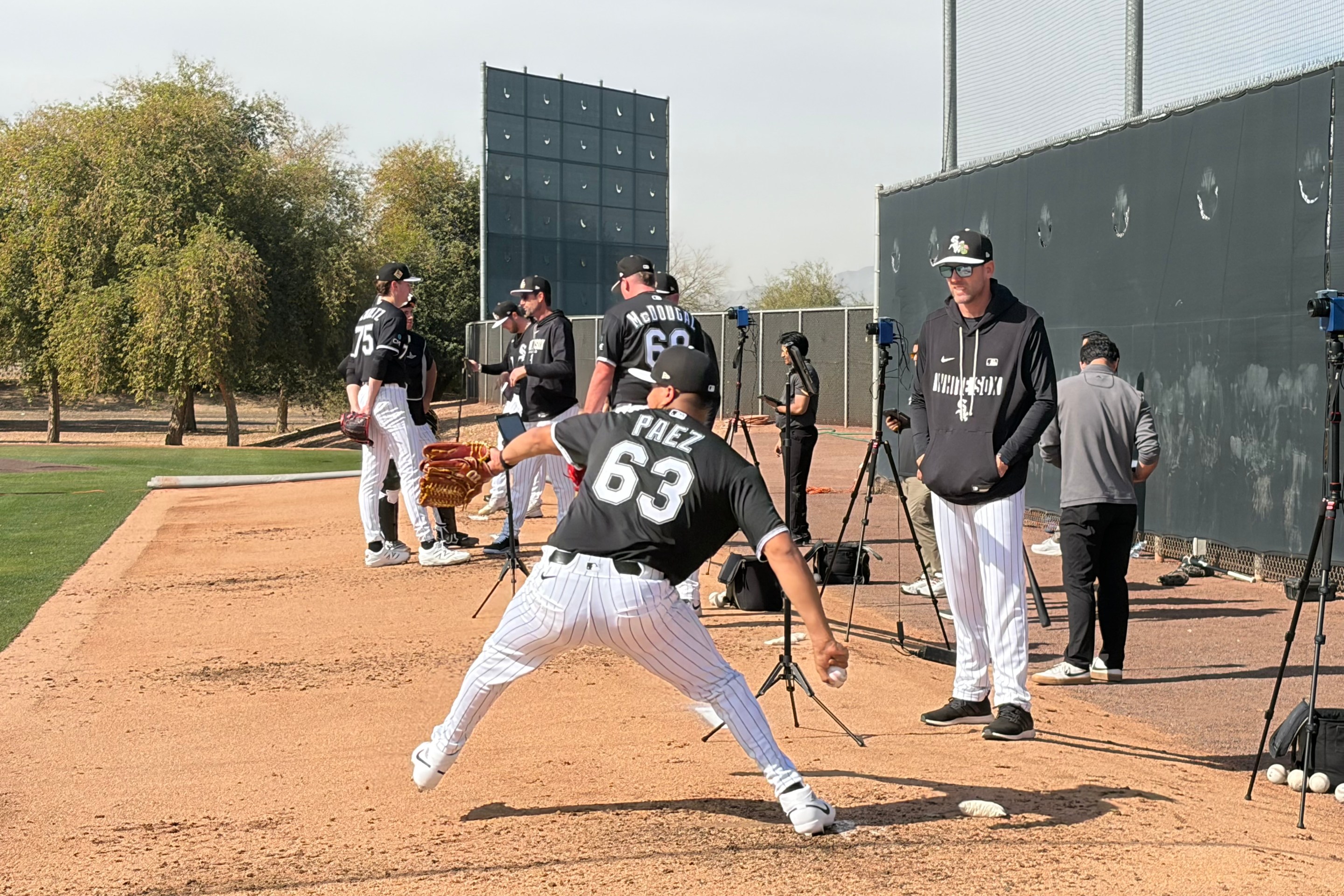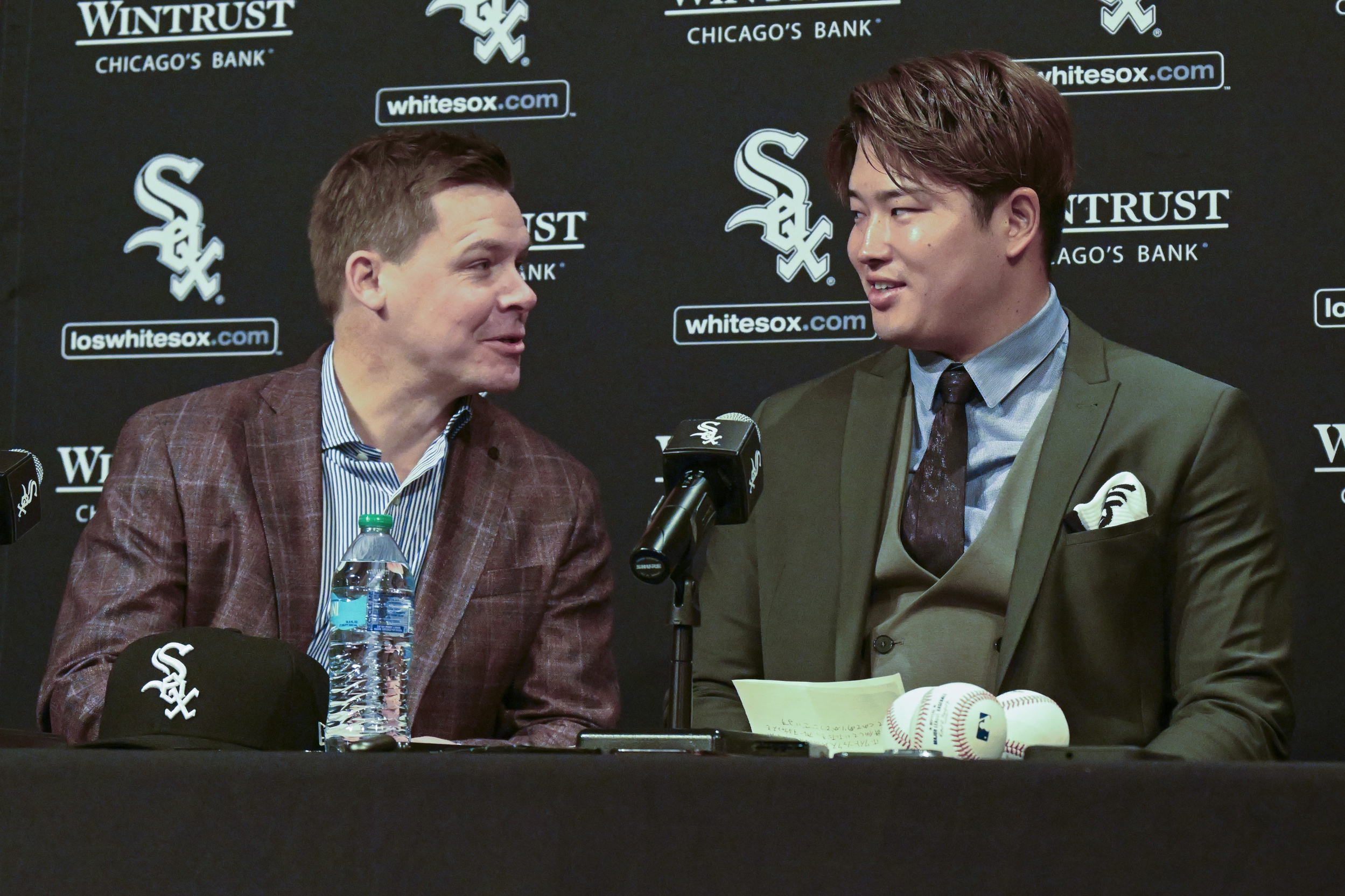Chase Meidroth's 15th game in the majors will be one that will take him at least 150 more to live down.
Not necessarily in Chicago, where he'll continue to be a welcome presence if he pairs credible shortstop defense with a strong sense of the strike zone at the top of the order. For the greater baseball world, however, a pop fly off his forehead -- right smack in the middle of the esteemed-in-spite-of-the-product logo on his cap -- sent his team careening to another brain-bruising loss to the Royals at Kauffman Stadium Tuesday night, and it too perfectly embodies the bewildering ineptitude of the Late-Stage White Sox to fade into the background. He or his team will have to play a lot better to put it behind them in shorter order, and that seems too much to ask of either right now.
But while some might say it's the day Meidroth became a White Sox, it struck me as more the day that Will Venable became a White Sox manager.
To the extent that Venable can develop a signature over just six weeks playing at a 45-win pace, it'd be the pairing of an even-keeled demeanor with a frenetic in-game management style that empties the bench in order to mask the deficiency of the moment. He's a duck paddling with several six-pack rings tangled around his feet, and it's one of the reasons why the White Sox have presented themselves as more respectable unit than their record would reflect.
But the record also indicates a terrible team, and it was only a matter of time before the White Sox's lack of talent would leave him in a position so many of his predecessors have encountered, in which he's tasked with explaining the inexplicable.
“Tough loss, no doubt about it,” manager Will Venable said. “We played a really good game up there until the ninth inning. And just like every game, we will evaluate what we can do better for next time.
“It was up there for a long time. I don’t know. Got to catch the ball, and we were unable to convert that forceout at second base, so, you know, tough play.”
The "I don't know" is when Venable's soul exited his body, and that means he's truly arrived at his position. This combination of words could have come from Pedro Grifol, or Rick Renteria, or Robin Ventura. Only Ozzie Guillen had the comic chops to properly ridicule the play without throwing a rookie under the bus, and oftentimes he couldn't even walk that line.
What's most remarkable about the White Sox's collapse is the variety, the bouquet of plays that went unmade. Meidroth stole the show with the Bonk Heard 'Round The World, but in the end, it was merely the most slapstick sort of simple physical error. The five other mistakes around it all had layers that better reflected the organization's larger shortcomings.
The Out-Of-Position Guy: I feel more comfortable with my decision to give Brooks Baldwin the Iron Glove for April in the season's first Month in a Box, because while it's not his fault the White Sox are trying to make him a superutility guy before he's mastered the "utility" part, his play in the outfield presently resembles that of a more aerodynamic Gavin Sheets. Maybe he catches this eighth-inning Salvador Perez double a year from now, but Tuesday was not the day.
Clock Too Slow: In Cam Booser's defense, it might be difficult to successfully defend a perfect bunt when playing between two largely unfamiliar teammates in Josh Rojas and Edgar Quero, but by ambling off the mound with third base on his mind while Quero immediate signaled to throw to first, his reaction looked like the biggest problem.
Clock Too Fast: Jake Amaya had a simple high-risk, high-reward proposition when he hit the ground to stop Jonathan India's bases-loaded, one-out grounder up the middle. If he conceded the possibility of an unlikely double play and took his time to get the catcher running to second, the game is tied, but retiring Bobby Witt Jr. in any fashion gets the game into extras. Get the ball out cleanly to Meidroth, and he'd start a heroic 6-4-3 double play that gets his keystone combo partner off the hook. The visions of the latter dissolved once he couldn't get the ball out of his glove in sync with the rest of his body, and given that Amaya would struggle to hold down a spot on 29 other MLB rosters, he flew too close to the sun here.
Too Big To Fail: In a game against the Guardians last year, Luis Robert Jr. opted against throwing home on a walk-off sacrifice fly, and while there was a 99.9% chance it wouldn't have made a difference, we did just witness the 0.1% outcome earlier last month when Mike Tauchman's hamstring aborted the mission running home.
Robert's aversion to eyewash surfaced again to end the game when he didn't complete his pursuit of Witt's warning-track fly. This was even less likely to matter in the grand scheme of things, because even a legless Drew Waters would've had time to roll home, but because Robert didn't record the out, Booser's ERA took a hit, and the Sox’s most high-profile trade asset invited another opportunity to scrutinize his level of engagement.
But they all took a backseat to:
You Had One Job: Say what you will about Meidroth taking a routine ninth-inning pop-up off the forehead, but ... no, wait -- first, say what you will about Meidroth taking a routine ninth-inning pop-up off the forehead. Just like Gordon Beckham colliding into Conor Gillaspie, it's a play that will prevent White Sox fans from assuming the out for years, if not decades.
Once you've said it, then note what happened afterward. Michael A. Taylor, a veteran who is a few weeks away from reaching 10 years of MLB service time and won a Gold Glove playing that very Kauffman Stadium outfield for the Royals in 2021, was presented with a simple throw to second base to salvage the out, and he looked as out of place as Baldwin, and as harried as Amaya, as he sailed the throw over second base.
Venable could've singled that play out for criticism more than any other, because the expectation of making such a play is why Taylor is here. Then again, maybe the fact that he didn't make that play explains why Taylor is here.






